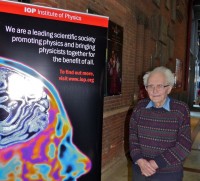By Margaret Harris
It’s pretty easy to see why the Royal Shakespeare Company (RSC) wanted to stage a play about J Robert Oppenheimer. There is definitely a bit of Macbeth in the way this ambitious, aloof theoretical physicist rose to become the scientific leader of the Manhattan Project during the Second World War. Equally, there’s a hint of Caesar or Lear in Oppenheimer’s eventual downfall, which came thanks to a toxic combination of political intrigue and his own arrogance.
The parallels between “Oppie” and Shakespeare’s tragic heroes were highlighted on Saturday, when a group of physicists and artists gathered on stage at the RSC’s Swan Theatre for a panel discussion on “Oppenheimer and the Bomb”. The discussion was part of a programme of events related to the RSC’s production of Oppenheimer, a new play written by Tom Morton-Smith and based on Oppenheimer’s life in the 1930s and 40s. During the discussion, one of the panel members, director Angus Jackson, called Oppenheimer “a play about leadership” as much as science, noting that the leadership conflicts that Oppenheimer experienced were “comparable” to those of the heroes in the RSC’s traditional repertoire.
The big difference, of course, is that Oppenheimer was a real person and there are plenty of people still alive who knew him. Gus Born, son of Oppenheimer’s one-time mentor Max Born, was in the audience for the panel discussion, and during the question-and-answer session he spoke about meeting Oppenheimer in 1926 when he was just five years old (“So you can work out my age,” he joked). Born also read aloud from a letter that his father wrote to Oppenheimer on the latter’s 60th birthday. Max Born had refused to work on the atomic bomb, and in the letter he described his former student as “burning with a responsibility almost too heavy for a human being”.
That sense of responsibility – along with other aspects of Oppenheimer’s personal story – clearly resonated with Morton-Smith, who was also on the panel. “I’d had in my head the idea of writing about physics for a long time,” he told the audience, citing the science-themed plays of Tom Stoppard and Michael Frayn as inspirations. So when the RSC asked him to pitch a “big idea” for a new production, he said “Oppenheimer was the biggest thing I could think of.”
The Institute of Physics sponsored the panel discussion as part of its “Physics and the Arts in Conversation” series, and the Institute’s president, Frances Saunders, made a few remarks at the beginning. Standing on a stage still marked with chalked equations from the previous night’s performance, she praised the play for depicting scientists “not as faceless people in white coats, but individuals with their own stories to tell”.
Will the story in Oppenheimer resonate with theatre audiences in the same way as, say, The Theory of Everything and The Imitation Game have with cinema-goers? To find out, you could go to see the play for yourself: it’s on until 7 March at the Swan Theatre in Stratford-upon-Avon. Alternatively, keep an eye on physicsworld.com, where my review of the production will appear soon.
UPDATE: My review of Oppenheimer is now live.


Has one this Oppenheimer without the Bomb as the Shakepearean Macbeth:
What bloody man is that? If we may guess,
His message by his looks …;
Or Hamlet:
And in this upshot, purposes mistook,
Fallen on th’inventors’ heads?
Trackback: Physics Viewpoint | Oppenheimer and the Bomb
Trackback: Oppenheimer | rooksheathscience